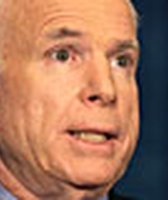Stand up for the facts!
Our only agenda is to publish the truth so you can be an informed participant in democracy.
We need your help.
I would like to contribute
SUMMARY: Mitt Romney's record as governor of Massachusetts and as a candidate for office puts him in a vulnerable position as rival Republicans attack his past.
It's tough to run for president as a social conservative when you previously led one of the country's most liberal states, a challenge Mitt Romney has struggled with all year.
The former governor of Massachusetts remains under assault, largely for his record as a governor and as a candidate in the New England state.
Republican rival Rudy Giuliani, himself a social moderate, is leading the charge, taking every opportunity to amplify Romney's political history. And it's not just the social policy stuff.
In November 2007, during an appearance on MSNBC's "Morning Joe" program, Giuliani accused Romney of once saying "he would be to the left of Teddy Kennedy on gay rights."
Then Giuliani added a more potent charge among GOP voters. He said Romney "didn't even support Ronald Reagan."
Romney has taken great pains to rebut Giuilani's charges during debate confrontations. But if Romney seems sensitive about his past campaign rhetoric, it's probably because there's reason to be.
While Romney never said he was "to the left of Teddy Kennedy on gay rights," Romney did reach out to gay and lesbian voters during his failed 1994 bid for Kennedy's Senate seat. More to the point, Romney said he could outperform Kennedy on gay and lesbian issues.
In an October 1994 letter to the Massachusetts chapter of the Log Cabin Republicans, a GOP gay rights group, Romney wrote, "For some voters it might be enough for me to simply match my opponent's record in this area. But I believe we can and must do better."
And during an August 1994 question and answer session with the Boston gay and lesbian newspaper Bay Windows, Romney said he could be a more effective advocate for gay rights than Kennedy because he is a Republican. "When Ted Kennedy speaks on gay rights, he's seen as an extremist. When Mitt Romney speaks on gay rights, he's seen as a centrist and a moderate," he said.
Some context is useful in explaining Romney's stance at the time. First, Massachusetts voters are amenable to gay rights. After all, Massachusetts was the first state to recognize gay marriage.
But probably more important is that at the time of Romney's 1994 Senate run, the state's governor was Bill Weld, a moderate Republican who garnered huge popularity. Weld favored fiscal conservatism and was supportive of abortion rights and gay rights. Later, his appointment of gay and lesbian officials to his administration and his support for a state commission on gay and lesbian youth made him a hero among gay rights activists, who hailed him as the most supportive governor in the country at that time.
Weld was up for re-election in 1994, the year Romney ran against Kennedy. Romney, in his interview with Bay Windows, made it plain that he hoped to ride Weld's coattails to victory. "I think Bill Weld comes as close as anyone," he said when asked whom in his party he aligned with. "I think Bill Weld's fiscal conservatism, his focus on creating jobs and employment and his efforts to fight discrimination and assure civil rights for all is a model that I identify with and aspire to."
As far as Giuliani's assertion that Romney "didn't even support Ronald Reagan," there's something to that, too.
Romney tried to put some distance between himself and Reagan in his 1994 race with Kennedy. During a televised debate with Kennedy that October, he rebutted Kennedy's effort to link him to the former president: "I was an independent during the time of Reagan-Bush," he said. "I'm not trying to return to Reagan-Bush."
Nowadays, it's clear Romney has had a conversion in his views on Ronald Reagan, repeatedly referencing the former president in the most glowing terms on the campaign trail. Social conservatives, he says, shouldn't hold his past criticism of the 40th president against him. "Now, I wasn't always a Ronald Reagan conservative. Neither was Ronald Reagan, by the way," he told a meeting of conservative activists in January.
Giuliani's attacks on Romney aren't altogether true, but there's enough merit to keep Romney open to more challenge as the campaign ramps up.
Our Sources
Senate debate 1994, "The real Romney?" Romney vs. Kennedy
MSNBC's "Morning Joe," "Rudolph Giuliani," Nov. 26, 2007
Letter to Log Cabin Republicans, "Mitt Romney," Oct. 6, 1994
Boston Globe, "Silber and Weld cross ideological boundaries," by Scot Lehigh, Sept. 21, 1990
Boston Globe, "Weld seen looking for middle ground in gay issue stand," by Don Aucoin, May 21, 1993
Boston Globe, "Weld panel supports teaching homosexual issues in high school," by Don Aucoin, Feb. 26, 1993
Boston Globe, "O'Brien draws Romney fire with stand on gay marriage," by Rick Klein and Stephanie Ebbert, Oct. 16, 2002
Boston Globe, "Romney reaches for Reagan touch," by Scott Helman, Nov. 25, 2006
Associated Press, "Romney says he was 'wrong' for moderate stands in 1994 Sen. race," by Glen Johnson, Jan. 11, 2007
Boston Globe, "Romney urges Ga. gathering to look at record," by Scott Helman, Jan. 7, 2007
Bay Windows, interview with Mitt Romney, August 1994





























